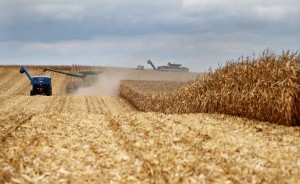
Sam Peterson is a MCGA student Agvocate and attends the University of Minnesota. Sam also works on his family’s farm near Northfield.
Written by MCGA student Agvocate Sam Peterson
Have you ever thought about what farmers do when they aren’t sitting in their tractors planting or harvesting their crops? It is a common misconception that farmers plant their crop in the spring, take it easy during the summer, harvest in the fall, and take a long vacation in the winter. Truth is, there is a lot going on behind the scenes. Farmers are busy year-round exploring new ways to improve their farms, planning what to do for the next year, maintaining equipment, and checking crops during the summer.
During the entire year, farmers are always trying to improve and become more efficient. They do this to improve their bottom line as well as lessen their impact on the environment. Educating themselves about new cropping practices or equipment and consulting with other farmers is a great way to learn new things and improve. Every farmer wants to learn and understand their land better by analyzing data collected over the year. Technological advances in agriculture have allowed farmers to collect and understand data they compile as they move across the field using GPS and recording devices installed in tractors. Analyzing this data is a great way for them to compare, contrast, and improve.
Farmers are usually a futuristic type of people. They are always planning ahead and looking at what they are going to do in the coming years. Farmers often use the data they analyze to make decisions about the future. It is not uncommon for farmers to buy their inputs (such as fertilizer) for their crops 4-6 months in advance because it not only saves them money, but allows them to make decisions while information is fresh in their mind. Being futuristic is a good risk management tool as well because it allows farmers to make multiple plans of action and execute the one that makes the most sense when the time comes.
The thing people see farmers doing the most is driving their equipment. Well, those tractors, combines, planters, etc. are not cheap, nor do they run forever. Farmers spend a good amount of time in the off season servicing the equipment they take so much pride in having. Servicing equipment also ensures that they have a season without any issues concerning the equipment, such as breakdowns, which decrease efficiency. Just like most people get their oil changed in their car every few months, farmers service their tractors and implements every few months to ensure everything is in working order.
Crop farmers also want to ensure that their crops are growing well throughout the season. Farmers rely on their crop to support their farm so they are treated like a prized possession. Every field is being scouted and tended to throughout the growing season to ensure that it is

Sam Peterson
producing the highest quality crop possible. While scouting the field, farmers are surveying for multiple factors. Anything from moisture in the soil, to the little white spots that may be appearing on the stem of the plant are important to the soil. They look for indicators like these to do their best in making decisions to prevent damage to the crop.
All farmers may wish they could plant their crop, kick back and relax for the summer, harvest it, and then go on vacation for the whole winter but that is not the case. Farmers are trying to improve themselves all the time so they can make better decisions for the future. They are also trying to prevent anything from happening to their crops or equipment while they are painstakingly waiting for their plants to grow into healthy, mature crops that provide food, feed, fiber and fuel for a growing world population.

